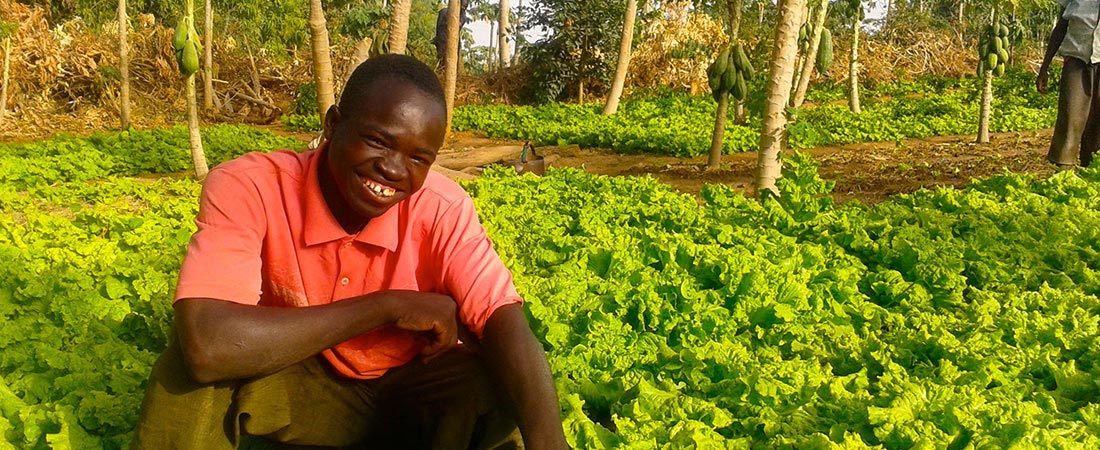Harvesting Opportunities

A participant in PAJE-Nièta
“The year was good, the year was bad, the future will come . . .”
Tata Sanogo leads a group of young women in a song about PAJE-Nièta, the youth entrepreneurship project they joined last spring. Sanogo, a university graduate, serves as a volunteer in the small village of Badioké, eight hours by bus from the capital city of Bamako.
The youth of Badioké have gathered to present their youth support volunteer with a gift of grain and thank her for the education and hope she’s given them. They clap, they laugh, they dance, and the song goes on.
“Youth, Mali youth, we’re telling you this: Learning is good.”
PAJE-Nièta—also known as the Support to Youth Entrepreneurs Project —provides basic literacy, work-readiness, and technical skills to 12,000 out-of-school rural youth ages 14 to 25. Recent university graduates are recruited to serve for two years as village-based volunteers and peer educators, instructing youth participants in basic education and work readiness. Funded by the U.S. Agency for International Development, the project is now in its second year. So far, the five-year project is in 100 communities, with plans to reach as many as 220 villages.
“Our program is delivered through and supported by existing youth associations at the community level,” says EDC’s Scott Isbrandt. “The volunteers gain real-world training and invaluable community development experience while helping rural youth gain essential skills needed to become entrepreneurs. These youth will be able to draw on this rich community development and youth empowerment experience during their future careers.”
Cultivating change
Youth choose from a list of seven technical-training options, identified by a project assessment of market opportunities for rural Malian youth. Since Mali is located in the Sahel—the transitional ecoregion dividing sub-Saharan Africa from the desert to the north—building entrepreneurial skills in the agro-pastoral sector is a natural course for many Malian youth.
“Many Malian youth are already working in the agro-pastoral sector,” Isbrandt says. “We would like to see youth gain the entrepreneurial skills needed to access opportunities and grow their own businesses—whether it’s in food production, processing agricultural produce to sell as bottled or dry products, or opening a restaurant. There’s a wide range of opportunities for youth in the agricultural sector.”
PAJE-Nièta, which Isbrandt describes as “a holistic youth empowerment/entrepreneurship program,” is divided into three major components: integrated basic education and work readiness in the local language (including reading, writing, math, and French); technical skills gained through training; and an accompaniment phase with technical monitoring and supervision as youth grow their entrepreneurship. It’s no coincidence that nièta means “progress” in the Malian language of Bambara.
Basic education is an important aspect, says Isbrandt, as “many of these youth have never had access to formal education, or if they have, not enough to have an impact on their livelihoods.” Mobile phone learning (mLearning) applications provided to project youth help students reinforce what they’re learning in and out of the classroom, with an emphasis on building key reading and entrepreneurship skills.
Taking new skills to market
Diango Cissé, a baker, used to sit by while other merchants sold every loaf of their day-old bread while his fresh loaves remained unsold. The work-readiness curriculum taught Cissé how to better market his goods—how to attract more customers by having his products ready on time, taking time to explain what made his bread different, listening to customers’ needs, and meeting their special requests. He soon began to outsell his competition. “PAJE has given me the strength to grow my business,” he explains.
Isbrandt is hopeful about the next phase of the project, as the first group of youth move into their second year. “We introduced the program during the rainy season in the first year, a time of high activity when project participants are usually unavailable,” he says. Yet many youth worked the fields during the day and attended trainings at night. “That level of participation showed a lot of goodwill and interest. There’s a lot of motivation and energy here.”
One of the Badioké villagers reflected on what PAJE-Nièta and volunteer teacher Tata Sanogo brought to their community: “Learning is our light, and Tata has become our light.”
